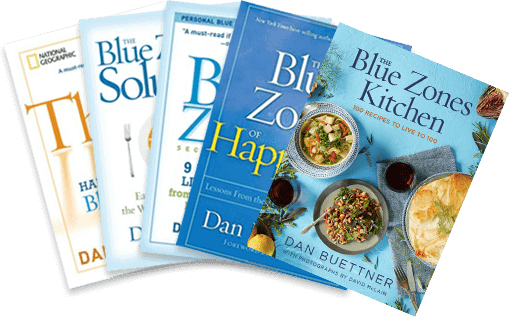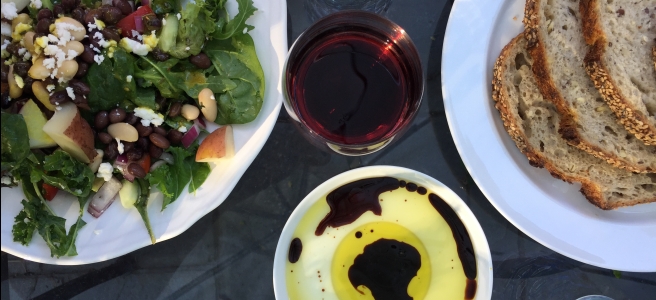I have been wanting to write about this for a year!
In January of 2021, I had just finished watching Down to Earth with Zac Efron and Darin Olien. A docuseries about the amazing communities and countries that are working to better the environment, it shows that there are ways to improve your health all while protecting the human race to successfully live on planet Earth. I loved it! It’s not just because I am a big fan of Hairspray, because who isn’t?
While a lot of the topics weren’t new to me, it was really cool to watch. I knew a lot about the benefits of France’s tapwater, Iceland’s energy conservation, but it was the centenarians in Italy that caught my eye. A bunch of scientist discovered that there are a group of people that are commonly living to be 100 or more. And Zac and Darin spend a whole episode learning about them and from them. Known as the Blue Zones, Darin, a health and fitness guru reveals to Zac that there are 5 zones on the planet that have high ratios of people living to be 100. And not living to be 100 in a wheelchair, on ventilators. I mean, living well: gardening, volunteering, daily walks and outings, visiting with great-great-grandkids, and frequenting the village pub for a daily vino. In fact, I got a little spun on it and even borrowed The Blue Zones Solution and Blue Zones Kitchen: 100 Recipes To Live To 100 book from the library (I actually own them now). And here is where my AHA moment came. My mind was blown. I am just in awe of this. Ready?

Choosing to live a green life, where you are good to the planet is not only easy to do and easy on your budget, as in the name of my blog, but it might just let you live to be a healthy, vibrant 100 year old. You getting this? Living a long life filled with vitality is possible, and it might help diminish the damage done to the greenhouse gas effect.
Let me explain.
The five areas on the planet where people are living well past their 80s and 90s are: Sardinia, Italy; the islands of Okinawa, Japan; Nicoya Peninsula in Costa Rica; Ikaria, Greece; and Loma Linda, California. At first, they don’t appear to have anything in common, but they do. And these commonalities are actually good for you, so much so, that you too could live to be 100 aaaaand, without knowing it, their healthy lifestyles are creating healthy environmental impacts.
Dan Buettner, author of the Blue Zones, is an American National Geographic Fellow and New York Times-bestselling author. He is an explorer, educator, author, producer, storyteller and public speaker, and this guy, with other National Geographic scientists, found out 9 practices all these people are doing. Here they are:
- Move naturally! The world’s longest-lived people don’t join gyms. Instead, they live in a way that makes them constantly move. They grow gardens and don’t have mechanical conveniences for house and yard work. This year, I baked everything by hand, with no electric mixer. Just one small step. My biceps were massive. The planet would be a lot happier if we biked, walked and scootered more. You know. Put down the electrical and gas-powered tools! Grab a broom. Grab a shovel. Grab a rake.

- Purpose! Everyone in these “Zones” have a purpose to themselves and others. For some it’s family, others it’s their communities. For me, it’s being involved in protecting the planet and the human race, raising my kids, and growing my homestead. Find a purpose for yourself. I suggest the climate crisis, and make it so that you take action: volunteer, sign petitions, vocalize your concerns on social media, talk to friends about your goal to make the planet liveable for seven generations, or longer!
- 80% rule! You’ll start to see a real connection to the planet here. “Hara hachi bu” – the Okinawan, 2500-year old Confucian mantra said before meals reminds them to stop eating when their stomachs are 80 percent full. The 20% gap between not being hungry and feeling full could be the difference between losing weight or gaining it. Their smallest meals are eaten in the late afternoon or early evening, and then they don’t eat any more the rest of the day. We know that Canadians and American are extremely wasteful with their food consumption. I wrote about it once. Did you know a whopping 58 per cent of all food produced in Canada — 35.5 million tonnes — is lost or wasted? That’s about 300 times as heavy as the CN Tower. That’s crazy! If we followed the 80% rule, we’d save a lot of food, energy, time, money and waste! And be healthier! Just think of how much food and agricultural impact there would be if North Americans purchased and consumed 20% less? Imagine the cattle industry and the methane that is released from them? Imagine 20% less!
- Plant slant! Eat your veggies like a Blue Zoner. Most meals are vegetarian with a heavy focus on beans. A lot of legumes, greens and veggies fill up plates with meat only being eaten on special occasions or in some zones, only once a week. Like in our home, Sardinians’ breakfasts are filled with goat cheese, eggs, sourdough bread, but the rest of the day is vegetables only with meat being for weddings or festivities, and only eaten at 3-4 oz ratios. That’s how we do it chez Jessica. We have chickens, so we eat eggs almost daily, but out of 14 other non-breakfast meals in a week of 21 meals, I’d say 13 of them are vegetarian or vegan. It’s VERY rare for us to eat meat more than once a week. When we do it’s venison or chicken and often on Sundays. We repurpose the bones for stock and soups and of course compost anything “wasted” after that.








- Down shift! To look and feel that good comes easily when you are purposely resting. Men and women around these parts are practicing the art of doing nothing a little bit each day. For some it’s happy hour, for others it’s church time, or maybe a siesta. For me, when my kids go to bed, I pour a cup of herbal tea and rest. I watch a show. I make sure to unwind. How can you tackle your purpose and live a meaningful life if you’re super tired? The greenhouse gas effect needs you to be rested for you to help reduce its impact.
- Cheers to a drink! Except for the Adventists in Loma Linda (and it’s not the case for all of them), the other four Zones enjoy 1-2 alcoholic bevies each day. It’s about spreading it out though, and no, you can’t have all 7-14 glasses on the weekend. Since we moved, we haven’t been brewing our beer. Can’t wait to go back to that. But even your after-work drinks can have environmental impacts. If you’re keeping it local with craft beers from your community, using Ontario-based grains, it’s even better than imported, international options. I still have a local beer on Fridays and a glass of Ontario wine on Saturdays or with certain meals. When we have friends over, I might even have 2! But that’s how we keep it.

- Belong! Research shows that attending faith-based services four times per month will add 4-14 years of life expectancy. It doesn’t matter what the denomination is. Now, I am not religious and I cannot foresee doing this myself, but I do practice spirtual readings and I do worship the moon. I know how witchy that sounds, but my daughter and I enjoy learning about its cycle, following her, practicing spirituality and thanks to her and to Mother Earth. Both “women” are badasses! And my daughter and I feel connected to the planet when we do this, and to each other.
- Loved ones first! Successful centenarians in the Blue Zones put their families first. This means keeping aging parents and grandparents nearby or in the home. Talk about fewer emissions if everyone is close by. They invest in their children with time and love (they’ll be more likely to care for you when the time comes). Imagine fostering this time with learning about conservation projects, subscribing and reading National Geographic Kids, watching documentaries, working on nature-based puzzles, teachings in the garden, raising chickens, feeding birds in the winter, going for nature walks and bike rides. All these things will foster a mini environmentalist, and you will strengthen your relationship. It’s pretty easy to raise a nature-loving child, even in the city.

- Your people! It has shown that the centenarians that choose to have a strong group of people around them are happier and live longer. I always say that I have a lot of acquaintences, but not a lot of friends, and I like it like that. I have about 5 close friends and everyone else is family. It makes our bonds strong and connected. I have confidantes. I also have trusting humans who want to hear me. I share with them my learnings on climate change and when I post about meetings, petitions, strikes, etc., I have their attention and they are likely to share too, or better yet, take action with me.
It might seem like a big life change. It sounds overwhelming if you read everything and then think: how do I do all of this right away? But you don’t! You take one project at a time, as my blog suggests. All my tips and tricks are just projects to tackle, one at a time, that are easy to do, easy on your budget and easy on the planet. Eating veggie-based is just plain cheaper! Meat is expensive, and frankly, destructive to the planet. Think of all the land needed to raise that much cattle. All the land needed to grow food for that cattle. All the water for that cattle. All the factories, transport trucks, grocery stores, etc etc. So there you go. I gave you your first project. Try the Blue Zones’ plant slant rule first. Once you get that, try the 80% rule. Nailing that? Go to moving naturally and say no to powered equipment for one project at a time and before you know it you’ll be on your way to living to be 100 plus helping save the planet and the human race!
